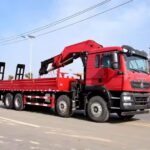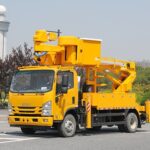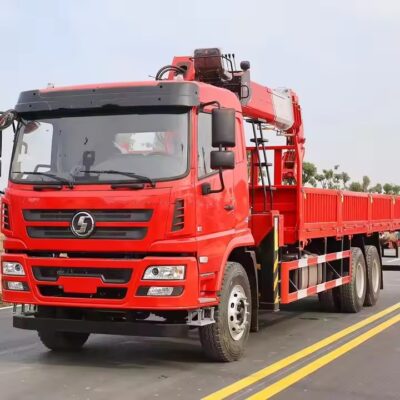The crane overload limiter is a crucial safety device designed to protect cranes from operating beyond their rated capacity, thereby preventing accidents and ensuring the safety of personnel and equipment. It employs various protection mechanisms, including alarms and automatic disconnections, to manage potential overload situations. Below are the primary functions of the crane overload limiter, detailing each function’s operation and significance.
1. Warning Function
The warning function is the first line of defense against potential overload situations. When the load weight approaches 90% of the crane’s rated capacity, a low-frequency sound alarm, accompanied by a visual indicator, is triggered. This serves as an early warning signal, allowing operators to take precautionary measures to avoid exceeding the crane’s load limits. The 90% threshold is modifiable based on the specific operational requirements or safety protocols of the construction site.
Importance of the Warning Function
- Awareness: Alerts the operator to monitor the load more closely.
- Prevention: Provides an opportunity to redistribute weight or adjust the load before reaching the critical limit.
2. Alarm Protection
If the load weight reaches 100% of the rated load, a high-frequency sound alarm is activated alongside a bright visual alarm indicator. This alarm is designed to alert operators that they have reached the maximum safe lifting capacity. If the alarm is not acknowledged and the load remains above 100% for a predetermined duration (which can be customized), the lifting circuit is automatically disconnected. This action effectively prohibits any lifting operations, ensuring that the crane does not operate under unsafe conditions.
Key Features of Alarm Protection
- High-Frequency Alarm: Easily noticeable, even in noisy environments.
- Automatic Circuit Disconnection: Prevents further lifting attempts, significantly reducing the risk of accidents.
3. Immediate Protection
For scenarios where the load exceeds 110% of the rated capacity, immediate protective measures are implemented. The lifting circuit is instantly disconnected, halting any lifting actions. Simultaneously, a loud alarm and high-frequency flashing lights are activated. This function is critical in preventing severe mechanical failures or accidents due to excessive loads.
Immediate Protection Benefits
- Quick Response: Ensures rapid disconnection to mitigate the risks associated with overloads.
- Safety Assurance: Reinforces the need for stringent adherence to load limits.
4. Phase Sequence Protection
The overload limiter also monitors the electrical supply to the crane. If an incorrect phase sequence is detected in the three-phase power supply, a sound and light alarm is triggered. A fault code is displayed, and both the main power control contacts and the lifting circuit control contacts are disconnected, prohibiting all crane operations. This feature prevents potential damage to the crane’s electrical system and ensures safe operation.
Importance of Phase Sequence Protection
- System Integrity: Protects the crane’s electrical components from damage due to incorrect wiring.
- Operational Safety: Prevents unsafe operations resulting from power supply issues.
5. Phase Loss Protection
Phase loss protection consists of several conditions to ensure safe operation in the event of a power supply issue:
- Phase A or B Loss: When powered on, if there is a loss of either phase A or phase B, the crane will not operate due to a lack of working power. The normally open contacts in the crane control circuit remain open, preventing any lifting or lowering. However, there is no sound or light alarm triggered in this case.
- Phase C Loss: If there is a loss of phase C when powered on, a sound and light alarm is triggered, a fault code is displayed, and both the main power control contacts and lifting circuit control contacts are disconnected, stopping all operations.
- Current Detection: During operation, if the current in any phase drops to zero, a sound and light alarm will activate. After a specified delay, a fault code will appear, and the system will disconnect power, halting all operations.
Phase Loss Protection Benefits
- Operational Continuity: Ensures the crane does not operate under insufficient power conditions.
- Safety Alerts: Provides immediate feedback to operators about potential electrical issues.
6. Short Circuit Protection
In the event of a short circuit, if the working current in any phase of the crane’s motor reaches 600% of the rated current, a sound and light alarm is triggered. If this condition persists for 0.8 seconds without being cleared, a fault code is displayed, and both the main power control contacts and lifting circuit control contacts are disconnected, prohibiting all operations. This function is crucial for protecting the electrical system from damage due to excessive current.
Significance of Short Circuit Protection
- Electrical Safety: Protects the crane’s electrical components from potential damage caused by short circuits.
- Immediate Response: Provides a rapid response to prevent dangerous electrical conditions.
7. Stall Protection
Stall protection monitors the motor’s current during startup. If the working current of any phase reaches 400% of the rated current during the startup process, a sound and light alarm is triggered. If this high current condition persists, a fault code will be displayed, and both the main power control contacts and lifting circuit control contacts will be disconnected, prohibiting all operations. This protection ensures the crane does not remain in a stalled condition, which could lead to overheating and equipment failure.
Benefits of Stall Protection
- Prevent Equipment Damage: Protects the crane motor from overheating and potential damage due to stalling.
- Operational Safety: Ensures the crane operates within safe electrical parameters.
8. Three-Phase Imbalance Protection
The overload limiter includes a function to detect three-phase current imbalances. If the current difference between any two phases exceeds 60%, a sound and light alarm is triggered. If this condition persists for five seconds, a fault code is displayed, and both the main power control contacts and the lifting circuit control contacts are disconnected, prohibiting all operations. This feature helps to maintain the integrity of the crane’s electrical systems and prevent issues associated with unbalanced loads.
Importance of Three-Phase Imbalance Protection
- Electrical System Integrity: Protects the crane from potential damage due to unbalanced power supply conditions.
- Safety Assurance: Minimizes the risk of electrical failures that could lead to crane accidents.
9. Under Voltage Protection
If the average voltage of the three-phase power supply drops below a predetermined under voltage threshold, a sound and light alarm is activated. If this condition persists for five seconds without being cleared, a fault code will be displayed, and both the main power control contacts and lifting circuit control contacts are disconnected, prohibiting all operations. This protection ensures that the crane does not operate under inadequate voltage conditions that could lead to malfunction or unsafe operation.
Benefits of Under Voltage Protection
- Operational Safety: Prevents crane operation under insufficient voltage, reducing the risk of mechanical failure.
- System Reliability: Maintains consistent performance by ensuring adequate power supply levels.
10. Over Voltage Protection
Conversely, if the average voltage of the three-phase power supply exceeds a predetermined over voltage threshold, a sound and light alarm is triggered. Like under voltage protection, if this condition persists for five seconds, a fault code is displayed, and both the main power control contacts and lifting circuit control contacts are disconnected, prohibiting all operations. This feature protects the crane’s electrical components from damage due to excessive voltage.
Importance of Over Voltage Protection
- Component Safety: Prevents damage to the crane’s electrical systems from excessive voltage conditions.
- Operational Integrity: Ensures the crane operates safely within its electrical specifications.
11. Over Current Protection
The overload limiter also features an over current protection mechanism, which acts based on inverse time characteristics. The action time can be customized according to user requirements. This function ensures that if the current exceeds a predetermined limit, the system will take appropriate measures to protect the crane’s electrical system, preventing potential damage from prolonged over current conditions.
Benefits of Over Current Protection
- Customizable Settings: Allows operators to tailor the protection settings based on operational needs.
- Prevent Equipment Damage: Protects the crane from potential failures associated with excessive current conditions.
Conclusion
The crane overload limiter is an essential safety component that encompasses various functions designed to protect cranes from overloads and electrical issues. Through its warning signals, alarm protections, and immediate disconnection capabilities, the overload limiter ensures safe operation, thereby safeguarding personnel and equipment.
By effectively monitoring load weights, power supply conditions, and electrical integrity, the overload limiter plays a crucial role in maintaining safety standards within the crane operation environment. Proper understanding and implementation of these functions are vital for operators and safety personnel, reinforcing the importance of adherence to operational guidelines and safety protocols in crane operations. As such, investing in high-quality overload limiters and ensuring they are properly calibrated and maintained is crucial for achieving a safe and efficient construction environment.













